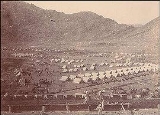
Siege of Malakand
Encyclopedia
The Siege of Malakand was the 26 July – 2 August 1897 siege
of the British
garrison in the Malakand
region of colonial British India's North West Frontier Province. The British faced a force of Pashtun
tribesmen whose tribal lands had been bisected by the Durand Line
, the 1,519 mile (2,445 km) border between Afghanistan
and British India drawn up at the end of the Anglo-Afghan wars to help hold the Russian Empire
's spread of influence towards the Indian subcontinent
.
The unrest caused by this division of the Pashtun lands led to the rise of Saidullah
, a Pashtun fakir
who led an army of at least 10,000 against the British garrison in Malakand. Although the British forces were divided amongst a number of poorly defended positions, the small garrison at the camp of Malakand South and the small fort at Chakdara
were both able to hold out for six days against the much larger Pashtun army.
The siege was lifted when a relief column dispatched from British positions to the south was sent to assist General William Hope Meiklejohn
, commander of the British forces at Malakand South. Accompanying this relief force was second lieutenant Winston Churchill
, who later published his account as The Story of the Malakand Field Force: An Episode of Frontier War.
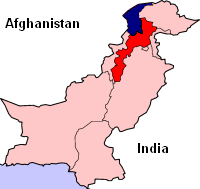 The rivalry between the British
The rivalry between the British
and the Russian Empire
s, named "The Great Game
" by Arthur Conolly
, centred on Afghanistan during the late 19th century. From the British perspective, Russian expansion threatened to destroy the so-called "jewel in the crown" of the British Empire, India
. As the Tsar's troops in Central Asia began to subdue one Khanate
after another, the British feared that Afghanistan would become a staging post for a Russian invasion. Against this background the British launched the First Anglo-Afghan War
in 1838, and attempted to impose a puppet regime under Shuja Shah. The regime was short-lived, however, and unsustainable without British military support. After the Russians sent an uninvited diplomatic mission
to Kabul
in 1878, tensions were renewed and Britain demanded that the ruler of Afghanistan (Sher Ali Khan
) accept a British diplomatic mission. The mission was turned back and, in retaliation, a force of 40,000 men was sent across the border by the British, launching the Second Anglo-Afghan War
.
After reaching a virtual stalemate with these two wars against the Afghans
, the British imposed the Durand Line in 1893, which divided Afghanistan and British India (now the North-West Frontier Province, Federally Administered Tribal Areas (F.A.T.A.)
and Balochistan
provinces of Pakistan). Named after Sir Mortimer Durand
, the foreign secretary of the British Indian government, it was agreed upon by the Emir of Afghanistan (Abdur Rahman Khan
) and the representatives of the British Empire but deeply resented by the Afghans. Its intended purpose was to serve as a buffer zone to inhibit the spread of Russian influence down into British India.
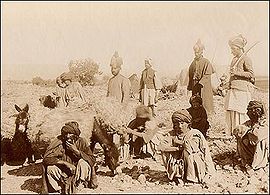 The British Malakand Field Force used the town of Nowshera as a base of operations. Nowshera was located south of the Kabul River
The British Malakand Field Force used the town of Nowshera as a base of operations. Nowshera was located south of the Kabul River
"six hours by rail from Rawal Pindi". Commanded by Colonel Schalch, the base served as a hospital while the normal garrison was serving 47 miles (76 km) away at Malakand Pass in what was known as the Malakand South Camp. This force consisted of one British cavalry regiment,one Indian cavalry regiment and one Indian infantry battalion. Winston Churchill
, who would accompany the relief force as a second lieutenant and war correspondent, described the camp as "...a great cup, of which the rim is broken into numerous clefts and jagged points. At the bottom of this cup is the 'crater' camp." Churchill goes on to state that the camp was viewed as purely temporary and was indefensible, as a result of its cramped conditions and the fact that it was dominated by the surrounding heights. A nearby camp, North Malakand, was also established on the plains of Khar, intended to hold the large number of troops that were unable to fit into the main camp. Both of these positions were garrisoned for two years with little fear of attack by a 1,000 strong force. Officers brought their families, and the camp held regular polo
matches and shooting competitions.
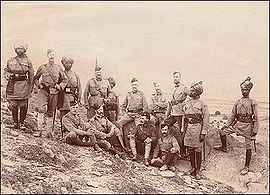 Towards 1897, news of unrest in the nearby Pashtun villages had reached the British garrisons in Malakand. Major Deane
Towards 1897, news of unrest in the nearby Pashtun villages had reached the British garrisons in Malakand. Major Deane
, the British political agent, noted the growing unrest within the Pashtun sepoy
s stationed with the British. His warnings were officially distributed to senior officers on 23 July 1897; however, nothing more than a minor skirmish was expected. Rumours of a new religious leader, Saidullah the Sartor Fakir
(also known as Mullah of Mastun), arriving to "sweep away" the British and inspire a jihad
, were reportedly circulating the bazaar
s of Malakand during July. Saidullah became known to the British as "The Great Fakir", "Mad Fakir" or the "Mad Mullah", and by the Pashtuns as lewanai faqir, or simply, lewanai, meaning "god-intoxicated".
On July 26, while British officers were playing polo
near camp Malakand North, indigenous spectators who were watching the match learned of an approaching Pashtun force and fled. Brigadier-General Meiklejohn, commander of the Malakand forces, was informed by Deane that "matters had assumed a very grave aspect" and that there were armed Pashtuns gathering nearby. Reinforcements from Mardan
(32 miles (51 km) away) were requested, and Lieutenant P. Eliott-Lockhart departed at 1.30am. At 9.45pm, a final telegram was received informing the garrison that the Fakir had passed Khar and was advancing on Malakand. The telegram also stated that neither the levies nor the people would act against him, and that the hills to the east of the camp were covered with Pathans. Shortly after, the communication wire was cut.
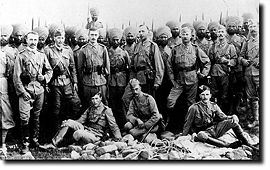
s. McRae immediately sent a small number of men under Major Taylor down a road from the "right flank" of the camp to ascertain the enemy's strength and location; McRae himself later followed with his own small group. Both parties aimed for a sharp turn in the oncoming road where, flanked by gorges, they hoped to hold the attacking force. McRae, with about 20 men, opened fire on the Pashtun tribesmen and began a fighting withdrawal 50 paces down the road before halting in an attempt to stop the attack. Taylor was mortally wounded in the incident and quickly died; McRae suffered a neck wound. Nevertheless, by 2:00 am reinforcements under the command of Lieutenant Barff had enabled the British to repel the Pashtun attack. The official dispatches of General Meiklejohn noted that:
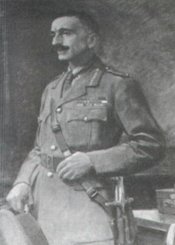 Meanwhile, Pashtun forces had successfully assaulted the camp in three other locations, and the 24th Punjab Infantry's picket lines were quickly overrun. Pashtun sharpshooters occupying the nearby heights inflicted casualties throughout the night, and the bazaar and surrounding buildings were occupied. Other units of the 24th, under Lieutenant Climo, retook the area and held it until 10:45 pm, but under fire from sharpshooters they were driven back. The Pashtun forces broke through in a number of other locations. Lieutenant Watling commanding a group of British troops guarding the ammunitions stores at the Quarter Guard was wounded, losing the stores in the process. Meiklejohn led a small group of sappers, members of the 24th and Captain Holland, Climo from the earlier charge, and Lieutenant Manley to recapture the ammunition dump; Holland and the General were wounded, and the group severely depleted as it twice failed to retake the dump, but a third attempt proved successful. However, continuing crossfire from the enveloping Pashtun troops wounded a number of British officers, placing the command of the 24th with Climo. Towards 1:00 am on the morning of July 27, Lieutenant Edmund William Costello rescued a wounded havildar
Meanwhile, Pashtun forces had successfully assaulted the camp in three other locations, and the 24th Punjab Infantry's picket lines were quickly overrun. Pashtun sharpshooters occupying the nearby heights inflicted casualties throughout the night, and the bazaar and surrounding buildings were occupied. Other units of the 24th, under Lieutenant Climo, retook the area and held it until 10:45 pm, but under fire from sharpshooters they were driven back. The Pashtun forces broke through in a number of other locations. Lieutenant Watling commanding a group of British troops guarding the ammunitions stores at the Quarter Guard was wounded, losing the stores in the process. Meiklejohn led a small group of sappers, members of the 24th and Captain Holland, Climo from the earlier charge, and Lieutenant Manley to recapture the ammunition dump; Holland and the General were wounded, and the group severely depleted as it twice failed to retake the dump, but a third attempt proved successful. However, continuing crossfire from the enveloping Pashtun troops wounded a number of British officers, placing the command of the 24th with Climo. Towards 1:00 am on the morning of July 27, Lieutenant Edmund William Costello rescued a wounded havildar
while under fire and was later awarded the Victoria Cross
for his actions.
As the night wore on, reinforcements arrived from a nearby British hill fort which had as yet been ignored by the Pashtun forces. At 4:15 pm, the attacking forces withdrew with their dead and wounded. The British had lost a large number of officers wounded, and recorded 21 deaths amongst the sepoys.
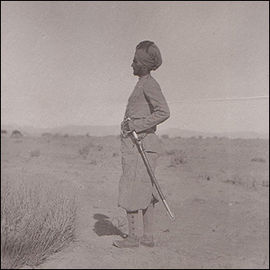 During the first night of the battle, the garrison at Malakand North had not seen much action despite being in the more exposed position, and had spent much of the night firing flares and manoeuvring artillery units. In response Meiklejohn ordered a reconnaissance of the vicinity, whereupon Major Gibbs, the commander of the force, encountered large groups of tribesmen in the valley. Subsequently, he was eventually ordered to collect his forces and stores from Malakand North, and transfer them into the southern camp.
During the first night of the battle, the garrison at Malakand North had not seen much action despite being in the more exposed position, and had spent much of the night firing flares and manoeuvring artillery units. In response Meiklejohn ordered a reconnaissance of the vicinity, whereupon Major Gibbs, the commander of the force, encountered large groups of tribesmen in the valley. Subsequently, he was eventually ordered to collect his forces and stores from Malakand North, and transfer them into the southern camp.
, No.1 and No.7 British Mountain Batteries, they set off to relieve the besieged garrison. Meanwhile at Malakand South, fresh Pashtun attacks were repulsed by elements of the 24th led by Climo, whose unit captured a Pashtun standard.
At 7:30 pm the first of the British reinforcements arrived in the form of infantry from the Corps of Guides
under Lieutenant Lockhart. The 45th Sikhs, supported by 100 men from the Guides and two guns, remained astride the main road into the camp, while the 31st Punjab Infantry held the centre; the 24th, under Climo, held the north edge of Malakand South. Subadar Syed Ahmed Shah of the 31st held the area around the bazaar, though the market place itself was left unoccupied. Around 8:00 pm the Pashtuns simultaneously attacked all the British positions where, "Many thousands of rounds were discharged" and a number of assaults repulsed. Subadar Syed Ahmed Shah and his forces defended their position for several hours, however the Pashtuns were eventually successful in undermining the walls and killing the defenders. The surviving sepoys and their leader were awarded the Order of Merit
. The 24th also repelled a number of charges, with VC recipient Costello receiving a wound in the arm. Despite the constant harassment by musket fire, rifle fire and a barrage of rocks, Climo successfully led a counter-attack with two companies, pushing the attacking forces back two miles. The British records for the night of July 27 record 12 killed among the sepoy ranks, as well as the wounding of Costello.
at 8:00 am – "Heavy fighting all night. Expect more tonight. What ammunition are you bringing? When may we expect you?" During the day, the Pashtuns prepared for another night attack while the British destroyed the bazaar and the regions previously defended, and lost, by Subadar Syed Ahmed Shah and the men of the 31st. Trees were also cut down to improve fields of fire, attracting further attention from the Pashtun sharpshooters. Major Stuart Beatsen arrived at 4:00 pm on the 29th with the 11th Bengal Lancers who had been summoned from Nowshera two days previous. The 35th Sikhs and 38th Dogras
arrived at the mouth of the pass leading to Malakand South, but after losing between 19 and 21 of their ranks through heat exhaustion, they were forced to halt.
At 2:00 a.m. on 30 July, the Pashtuns launched another attack, during which Costello, and the Pashtun Mullah
, were both wounded; the British also recorded one fatality among the sepoy contingent. That evening a further attack was repulsed by a bayonet charge of the 45th Sikhs. The following morning, on 31 July, the remainder of the 38th Dogras and 35th Sikhs entered Malakand South under the command of Colonel Reid, bringing with them 243 mules carrying 291,600 rounds of ammunition. But with their attention now drawn towards the nearby British outpost of Chakdara, attacks by the Pashtuns on Malakand South began to reduce until they ceased altogether. Churchill records a total of three British officers killed in action and 10 wounded, seven sepoy officers wounded, and 153 non-commissioned officer
s killed and wounded during the siege of Malakand South.
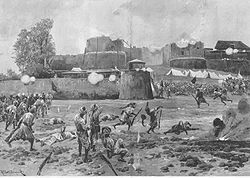 On 28 July, when word of the attacks were received, a division of "6800 bayonets, 700 lances or sabres, with 24 guns" was given to Major-General Sir Bindon Blood
On 28 July, when word of the attacks were received, a division of "6800 bayonets, 700 lances or sabres, with 24 guns" was given to Major-General Sir Bindon Blood
with orders to hold "the
Malakand, and the adjacent posts, and of operating against the neighbouring tribes as may be required." Blood arrived at Nowshera on 31 July 1897 to take command, and on 1 August he was informed that the Pashtun forces had turned their attention to the nearby British fort of Chakdara. This was a small, under-garrisoned fort with few supplies that had itself been holding out with 200 men since the first attacks in Malakand began, and had recently sent the signal "Help us" to the British forces. Blood reached Malakand at noon on the same day. While Blood and his relief force marched for Chakdara from the main camp at Nowshera, Meiklejohn set out from Malakand South with the 45th, 24th and guns from No. 8 Battery. An advance force of Guides cavalry under Captain Baldwin met with an enemy force along the road and were forced to retreat with two British officers and one sepoy officer wounded and 16 other ranks killed or wounded.
Following this failed attempt, Blood arrived and appointed Reid commander of the forces at Malakand South, giving command of the rescue force to Meiklejohn. The rescue column of 1,000 infantry, two squadrons from the 11th Bengal Lancers, two of the Guides cavalry, 50 sappers, two cannons and a hospital detail, rested on the night of August 1, despite a night attack by Pashtun forces. On the following day, the relief force advanced along the road to the abandoned Malakand North in order to avoid fire from the Pashtun sharpshooters who still occupied the heights around the Malakand South "cup". With low morale, the relief force assembled at 4:30 am on 2 August; however, with the use of diversionary attacks, they were successful in breaking out of the Pashtun encirclement without loss. This led to confusion amongst the Pashtun forces, "like ants in a disturbed ant–hill" as observed Blood. The 11th Bengal Lancers and the Guides cavalry went on to relieve the threatened fort at Chakdara, while the 45th Sikhs stormed nearby Pashtun positions. The British recorded 33 casualties from the action on August 2.
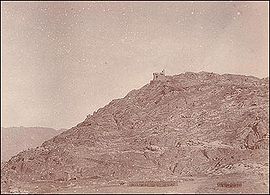 The campaigns of the Malakand Field Force continued beyond the siege of Malakand South, North, and of the Chakdara fort. Immediately after the siege, two brigades of the British garrison were relocated to a new camp a few miles away to relieve the pressure in the overcrowded Malakand South. These received only light fire during 5 August 1897; however, on 8 August, Saidullah rallied his surviving Pashtun forces and attacked the British garrison at Shabkadr fort near Peshawar
The campaigns of the Malakand Field Force continued beyond the siege of Malakand South, North, and of the Chakdara fort. Immediately after the siege, two brigades of the British garrison were relocated to a new camp a few miles away to relieve the pressure in the overcrowded Malakand South. These received only light fire during 5 August 1897; however, on 8 August, Saidullah rallied his surviving Pashtun forces and attacked the British garrison at Shabkadr fort near Peshawar
. These attacks put the continued loyalty of friendly Pashtun levies guarding the British supply lines to Chitral
at risk, thus endangering the supply convoys and their small escorts. In response, on 14 August, the British advanced farther into Pashtun territory and engaged a force of "several thousand" Pashtun tribesmen, with General Meiklejohn leading a flanking manoeuvre which split the Pashtun army in two, forcing it to pull back to Landakai
. The British continued to engage Pashtun tribesmen throughout the day, suffering two officers and 11 other ranks killed.
The siege of Malakand was Winston Churchill's first experience of actual combat, which he later described in several columns for The Daily Telegraph
, receiving £5 per column; these articles were eventually compiled into his first published book, The Story of the Malakand Field Force, beginning his career as a writer and politician. Of the book's publication he remarked, "[it] will certainly be the most noteworthy act of my life. Up to date (of course). By its reception I shall measure the chances of my possible success in the world." Of the siege of Malakand, and of the entire campaign against the Pashtun tribes in northern Pakistan, Churchill remarked that they were a period of significant "transition".
The War Office
authorized the award of the clasp Malakand 1897 to the India Medal
for those of the British
and Indian
armies who participated in this action. The battleground remained closed to visitors and under military control since the publication of Churchill's memoirs, and is the location of a Pakistani military base. However in 2006 the Pakistani government began opening the area to foreign visitors.
Siege
A siege is a military blockade of a city or fortress with the intent of conquering by attrition or assault. The term derives from sedere, Latin for "to sit". Generally speaking, siege warfare is a form of constant, low intensity conflict characterized by one party holding a strong, static...
of the British
British Raj
British Raj was the British rule in the Indian subcontinent between 1858 and 1947; The term can also refer to the period of dominion...
garrison in the Malakand
Malakand Agency
The Malakand Agency was one of the Tribal Areas in the North West Frontier Province of Pakistan until 1970. It included the princely states of Chitral, Dir and Swat, and an area around the Malakand Fort known as the Malakand Protected Area.In 1970, following the abolition of the princely states,...
region of colonial British India's North West Frontier Province. The British faced a force of Pashtun
Pashtun people
Pashtuns or Pathans , also known as ethnic Afghans , are an Eastern Iranic ethnic group with populations primarily between the Hindu Kush mountains in Afghanistan and the Indus River in Pakistan...
tribesmen whose tribal lands had been bisected by the Durand Line
Durand Line
The Durand Line refers to the porous international border between Pakistan and Afghanistan, which has divided the ethnic Pashtuns . This poorly marked line is approximately long...
, the 1,519 mile (2,445 km) border between Afghanistan
Afghanistan
Afghanistan , officially the Islamic Republic of Afghanistan, is a landlocked country located in the centre of Asia, forming South Asia, Central Asia and the Middle East. With a population of about 29 million, it has an area of , making it the 42nd most populous and 41st largest nation in the world...
and British India drawn up at the end of the Anglo-Afghan wars to help hold the Russian Empire
Russian Empire
The Russian Empire was a state that existed from 1721 until the Russian Revolution of 1917. It was the successor to the Tsardom of Russia and the predecessor of the Soviet Union...
's spread of influence towards the Indian subcontinent
Indian subcontinent
The Indian subcontinent, also Indian Subcontinent, Indo-Pak Subcontinent or South Asian Subcontinent is a region of the Asian continent on the Indian tectonic plate from the Hindu Kush or Hindu Koh, Himalayas and including the Kuen Lun and Karakoram ranges, forming a land mass which extends...
.
The unrest caused by this division of the Pashtun lands led to the rise of Saidullah
Saidullah
Saidullah was a Pashtun fakir and religious mendicant whose Pashto name translated to "God-intoxicated" as a reference to his religious convictions and his belief that he was capable of miraculous powers...
, a Pashtun fakir
Fakir
The fakir or faqir ; ) Derived from faqr is a Muslim Sufi ascetic in Middle East and South Asia. The Faqirs were wandering Dervishes teaching Islam and living on alms....
who led an army of at least 10,000 against the British garrison in Malakand. Although the British forces were divided amongst a number of poorly defended positions, the small garrison at the camp of Malakand South and the small fort at Chakdara
Chakdara
Chakdara is a town in Lower Dir District of Khyber-Pakhtunkhwa. It is located north of Malakand on the north bank of the Swat River, in a commanding position near the entrance to Swat District and at the entrance to Lower Dir...
were both able to hold out for six days against the much larger Pashtun army.
The siege was lifted when a relief column dispatched from British positions to the south was sent to assist General William Hope Meiklejohn
William Hope Meiklejohn
Brigadier-General William Hope Meiklejohn CB CMG was a British military commander who, as a colonel, was in charge of the British garrison during the siege of Malakand in northern Pakistan from 26 July to 2 August 1897 and who later led a relief force to the besieged fort of Chakdara along with Sir...
, commander of the British forces at Malakand South. Accompanying this relief force was second lieutenant Winston Churchill
Winston Churchill
Sir Winston Leonard Spencer-Churchill, was a predominantly Conservative British politician and statesman known for his leadership of the United Kingdom during the Second World War. He is widely regarded as one of the greatest wartime leaders of the century and served as Prime Minister twice...
, who later published his account as The Story of the Malakand Field Force: An Episode of Frontier War.
Background

British Empire
The British Empire comprised the dominions, colonies, protectorates, mandates and other territories ruled or administered by the United Kingdom. It originated with the overseas colonies and trading posts established by England in the late 16th and early 17th centuries. At its height, it was the...
and the Russian Empire
Russian Empire
The Russian Empire was a state that existed from 1721 until the Russian Revolution of 1917. It was the successor to the Tsardom of Russia and the predecessor of the Soviet Union...
s, named "The Great Game
The Great Game
The Great Game or Tournament of Shadows in Russia, were terms for the strategic rivalry and conflict between the British Empire and the Russian Empire for supremacy in Central Asia. The classic Great Game period is generally regarded as running approximately from the Russo-Persian Treaty of 1813...
" by Arthur Conolly
Arthur Conolly
Arthur Conolly was a British intelligence officer, explorer and writer. He was a captain of the 1st Bengal Light Cavalry in the service of the British East India Company...
, centred on Afghanistan during the late 19th century. From the British perspective, Russian expansion threatened to destroy the so-called "jewel in the crown" of the British Empire, India
British Raj
British Raj was the British rule in the Indian subcontinent between 1858 and 1947; The term can also refer to the period of dominion...
. As the Tsar's troops in Central Asia began to subdue one Khanate
Khanate
Khanate, or Chanat, is a Turco-Mongol-originated word used to describe a political entity ruled by a Khan. In modern Turkish, the word used is kağanlık, and in modern Azeri of the republic of Azerbaijan, xanlıq. In Mongolian the word khanlig is used, as in "Khereidiin Khanlig" meaning the Khanate...
after another, the British feared that Afghanistan would become a staging post for a Russian invasion. Against this background the British launched the First Anglo-Afghan War
First Anglo-Afghan War
The First Anglo-Afghan War was fought between British India and Afghanistan from 1839 to 1842. It was one of the first major conflicts during the Great Game, the 19th century competition for power and influence in Central Asia between the United Kingdom and Russia, and also marked one of the worst...
in 1838, and attempted to impose a puppet regime under Shuja Shah. The regime was short-lived, however, and unsustainable without British military support. After the Russians sent an uninvited diplomatic mission
Diplomatic mission
A diplomatic mission is a group of people from one state or an international inter-governmental organisation present in another state to represent the sending state/organisation in the receiving state...
to Kabul
Kabul
Kabul , spelt Caubul in some classic literatures, is the capital and largest city of Afghanistan. It is also the capital of the Kabul Province, located in the eastern section of Afghanistan...
in 1878, tensions were renewed and Britain demanded that the ruler of Afghanistan (Sher Ali Khan
Sher Ali Khan
Sher Ali Khan was Amir of Afghanistan from 1863 to 1866 and from 1868 until his death in 1879. He was the third son of Dost Mohammed Khan, founder of the Barakzai Dynasty in Afghanistan....
) accept a British diplomatic mission. The mission was turned back and, in retaliation, a force of 40,000 men was sent across the border by the British, launching the Second Anglo-Afghan War
Second Anglo-Afghan War
The Second Anglo-Afghan War was fought between the United Kingdom and Afghanistan from 1878 to 1880, when the nation was ruled by Sher Ali Khan of the Barakzai dynasty, the son of former Emir Dost Mohammad Khan. This was the second time British India invaded Afghanistan. The war ended in a manner...
.
After reaching a virtual stalemate with these two wars against the Afghans
Demographics of Afghanistan
The population of Afghanistan is around 29,835,392 as of the year 2011, which is unclear if the refugees living outside the country are included or not. The nation is composed of a multi-ethnic and multi-lingual society, reflecting its location astride historic trade and invasion routes between...
, the British imposed the Durand Line in 1893, which divided Afghanistan and British India (now the North-West Frontier Province, Federally Administered Tribal Areas (F.A.T.A.)
Federally Administered Tribal Areas
The Federally Administered Tribal Areas are a semi-autonomous tribal region in the northwest of Pakistan, lying between the province of Khyber Pakhtunkhwa, Balochistan, and the neighboring country of Afghanistan. The FATA comprise seven Agencies and six FRs...
and Balochistan
Balochistan (Pakistan)
Balochistan is one of the four provinces or federating units of Pakistan. With an area of 134,051 mi2 or , it is the largest province of Pakistan, constituting approximately 44% of the total land mass of Pakistan. According to the 1998 population census, Balochistan had a population of...
provinces of Pakistan). Named after Sir Mortimer Durand
Mortimer Durand
Sir Henry Mortimer Durand was a British diplomat and civil servant of colonial British India.-Background:Born at Sehore, Bhopal, India, he was the son of Sir Henry Marion Durand, the Resident of Baroda and he was educated at Blackheath Proprietary School, and Tonbridge School.-Career:Durand...
, the foreign secretary of the British Indian government, it was agreed upon by the Emir of Afghanistan (Abdur Rahman Khan
Abdur Rahman Khan
Abdur Rahman Khan was Emir of Afghanistan from 1880 to 1901.The third son of Mohammad Afzal Khan, and grandson of Dost Mohammad Khan, Abdur Rahman Khan was considered a strong ruler who re-established the writ of the Afghan government in Kabul after the disarray that followed the second...
) and the representatives of the British Empire but deeply resented by the Afghans. Its intended purpose was to serve as a buffer zone to inhibit the spread of Russian influence down into British India.
Malakand Field Force

Kabul River
Kabul River , the classical Cophes , is a 700 km long river that starts in the Sanglakh Range of the Hindu Kush Mountains in Afghanistan and ends in the Indus River near Attock, Pakistan. It is the main river in eastern Afghanistan and is separated from the watershed of the Helmand by the Unai Pass...
"six hours by rail from Rawal Pindi". Commanded by Colonel Schalch, the base served as a hospital while the normal garrison was serving 47 miles (76 km) away at Malakand Pass in what was known as the Malakand South Camp. This force consisted of one British cavalry regiment,one Indian cavalry regiment and one Indian infantry battalion. Winston Churchill
Winston Churchill
Sir Winston Leonard Spencer-Churchill, was a predominantly Conservative British politician and statesman known for his leadership of the United Kingdom during the Second World War. He is widely regarded as one of the greatest wartime leaders of the century and served as Prime Minister twice...
, who would accompany the relief force as a second lieutenant and war correspondent, described the camp as "...a great cup, of which the rim is broken into numerous clefts and jagged points. At the bottom of this cup is the 'crater' camp." Churchill goes on to state that the camp was viewed as purely temporary and was indefensible, as a result of its cramped conditions and the fact that it was dominated by the surrounding heights. A nearby camp, North Malakand, was also established on the plains of Khar, intended to hold the large number of troops that were unable to fit into the main camp. Both of these positions were garrisoned for two years with little fear of attack by a 1,000 strong force. Officers brought their families, and the camp held regular polo
Polo
Polo is a team sport played on horseback in which the objective is to score goals against an opposing team. Sometimes called, "The Sport of Kings", it was highly popularized by the British. Players score by driving a small white plastic or wooden ball into the opposing team's goal using a...
matches and shooting competitions.
Outbreak of the battle

Harold Arthur Deane
Lieutenant-Colonel Sir Harold Arthur Deane KCSI was an administrator in British India. Deane served as the first Political Agent of the Malakand in 1895 and also as the first Chief Commissioner of the North-West Frontier Province upon the creation of the province on 9 November 1901.-Career:Deane...
, the British political agent, noted the growing unrest within the Pashtun sepoy
Sepoy
A sepoy was formerly the designation given to an Indian soldier in the service of a European power. In the modern Indian Army, Pakistan Army and Bangladesh Army it remains in use for the rank of private soldier.-Etymology and Historical usage:...
s stationed with the British. His warnings were officially distributed to senior officers on 23 July 1897; however, nothing more than a minor skirmish was expected. Rumours of a new religious leader, Saidullah the Sartor Fakir
Fakir
The fakir or faqir ; ) Derived from faqr is a Muslim Sufi ascetic in Middle East and South Asia. The Faqirs were wandering Dervishes teaching Islam and living on alms....
(also known as Mullah of Mastun), arriving to "sweep away" the British and inspire a jihad
Jihad
Jihad , an Islamic term, is a religious duty of Muslims. In Arabic, the word jihād translates as a noun meaning "struggle". Jihad appears 41 times in the Quran and frequently in the idiomatic expression "striving in the way of God ". A person engaged in jihad is called a mujahid; the plural is...
, were reportedly circulating the bazaar
Bazaar
A bazaar , Cypriot Greek: pantopoula) is a permanent merchandising area, marketplace, or street of shops where goods and services are exchanged or sold. The term is sometimes also used to refer to the "network of merchants, bankers and craftsmen" who work that area...
s of Malakand during July. Saidullah became known to the British as "The Great Fakir", "Mad Fakir" or the "Mad Mullah", and by the Pashtuns as lewanai faqir, or simply, lewanai, meaning "god-intoxicated".
On July 26, while British officers were playing polo
Polo
Polo is a team sport played on horseback in which the objective is to score goals against an opposing team. Sometimes called, "The Sport of Kings", it was highly popularized by the British. Players score by driving a small white plastic or wooden ball into the opposing team's goal using a...
near camp Malakand North, indigenous spectators who were watching the match learned of an approaching Pashtun force and fled. Brigadier-General Meiklejohn, commander of the Malakand forces, was informed by Deane that "matters had assumed a very grave aspect" and that there were armed Pashtuns gathering nearby. Reinforcements from Mardan
Mardan
Mardan , known as The city of hospitality, is a city and headquarters of Mardan District in Khyber Pakhtunkhwa Province, Pakistan. It is the de facto headquarters of the Yousafzai tribe and the second most populous city in the province, located at 34°12'0N 72°1'60E and an altitude of in the south...
(32 miles (51 km) away) were requested, and Lieutenant P. Eliott-Lockhart departed at 1.30am. At 9.45pm, a final telegram was received informing the garrison that the Fakir had passed Khar and was advancing on Malakand. The telegram also stated that neither the levies nor the people would act against him, and that the hills to the east of the camp were covered with Pathans. Shortly after, the communication wire was cut.
Night of July 26/27

South camp
During the night of 26 July, sometime after 10:00 pm, a messenger arrived with word that the enemy had reached the village of Khar, three miles from Malakand. A bugle call was immediately sounded within the camp. Lieutenant-Colonel McRae, commanding the 45th Sikhs, two units from the 31st Punjab Infantry, two Guns from No. 8 Mountain Battery and one Squadron from the 11th Bengal Lancers, was to have been sent to Amandara Pass – a distance of four miles – with orders to hold the position; however, the Pashtun column had already arrived at the South Malakand camp, surprising the British defenders, and began to open fire on the garrison with musketMusket
A musket is a muzzle-loaded, smooth bore long gun, fired from the shoulder. Muskets were designed for use by infantry. A soldier armed with a musket had the designation musketman or musketeer....
s. McRae immediately sent a small number of men under Major Taylor down a road from the "right flank" of the camp to ascertain the enemy's strength and location; McRae himself later followed with his own small group. Both parties aimed for a sharp turn in the oncoming road where, flanked by gorges, they hoped to hold the attacking force. McRae, with about 20 men, opened fire on the Pashtun tribesmen and began a fighting withdrawal 50 paces down the road before halting in an attempt to stop the attack. Taylor was mortally wounded in the incident and quickly died; McRae suffered a neck wound. Nevertheless, by 2:00 am reinforcements under the command of Lieutenant Barff had enabled the British to repel the Pashtun attack. The official dispatches of General Meiklejohn noted that:
"There is no doubt that the gallant resistance made by this small body
in the gorge, against vastly superior numbers, till the arrival of the
rest of the regiment, saved the camp from being rushed on that side, and
I cannot speak too highly of the behaviour of Lieutenant-Colonel McRae
and Major Taylor on this occasion."

Havildar
Havildar ) was the Military 'In Charge' of a Fort during the times of Maratha Empire. In the British Indian Army it was equivalent rank to Sergeant, next above Naik, and is still used in the modern Indian Army and Pakistan Army. The cavalry equivalent is Daffadar...
while under fire and was later awarded the Victoria Cross
Victoria Cross
The Victoria Cross is the highest military decoration awarded for valour "in the face of the enemy" to members of the armed forces of various Commonwealth countries, and previous British Empire territories....
for his actions.
As the night wore on, reinforcements arrived from a nearby British hill fort which had as yet been ignored by the Pashtun forces. At 4:15 pm, the attacking forces withdrew with their dead and wounded. The British had lost a large number of officers wounded, and recorded 21 deaths amongst the sepoys.
North camp

July 27
The last remaining forces from the now evacuated northern camp arrived in Malakand South at 8:30 am on the 27th, coinciding with the arrival of more Pashtun reinforcements. In Nowshera, the 11th Bengal Lancers awoke to news describing the situation, and, together with the 8th Dogras, the 35th Sikhs35th Sikhs
The 35th Sikhs were an infantry regiment of the British Indian Army. They could trace their origins to 1887, when thy were raised as the 35th Bengal Infantry.The regiment took part in the Siege of Malakand in 1897 AND World War I...
, No.1 and No.7 British Mountain Batteries, they set off to relieve the besieged garrison. Meanwhile at Malakand South, fresh Pashtun attacks were repulsed by elements of the 24th led by Climo, whose unit captured a Pashtun standard.
At 7:30 pm the first of the British reinforcements arrived in the form of infantry from the Corps of Guides
Corps of Guides (British India)
The Corps of Guides was a regiment of the British Indian Army which served in the North West Frontier and had a unique composition of being part infantry and part cavalry.-History:...
under Lieutenant Lockhart. The 45th Sikhs, supported by 100 men from the Guides and two guns, remained astride the main road into the camp, while the 31st Punjab Infantry held the centre; the 24th, under Climo, held the north edge of Malakand South. Subadar Syed Ahmed Shah of the 31st held the area around the bazaar, though the market place itself was left unoccupied. Around 8:00 pm the Pashtuns simultaneously attacked all the British positions where, "Many thousands of rounds were discharged" and a number of assaults repulsed. Subadar Syed Ahmed Shah and his forces defended their position for several hours, however the Pashtuns were eventually successful in undermining the walls and killing the defenders. The surviving sepoys and their leader were awarded the Order of Merit
Order of Merit
The Order of Merit is a British dynastic order recognising distinguished service in the armed forces, science, art, literature, or for the promotion of culture...
. The 24th also repelled a number of charges, with VC recipient Costello receiving a wound in the arm. Despite the constant harassment by musket fire, rifle fire and a barrage of rocks, Climo successfully led a counter-attack with two companies, pushing the attacking forces back two miles. The British records for the night of July 27 record 12 killed among the sepoy ranks, as well as the wounding of Costello.
July 28
The daylight hours of 28 July saw continuous fire from the Pashtun sharpshooters established in the hills surrounding Malakand South. The garrison surgeon, Lieutenant J.H. Hugo, treated a number of British casualties including an officer from the Guides. Despite further attacks during the night of July 28/29, the British recorded only two killed from the sepoy ranks, and the severe wounding of a Lieutenant Ford. Churchill records that Ford's bleeding artery was clamped shut by Hugo despite being under fire.July 29–July 31
Having re-established communication on the morning of 29 July, the British garrison signalled the approaching relief forces via heliographHeliograph
A heliograph is a wireless solar telegraph that signals by flashes of sunlight reflected by a mirror. The flashes are produced by momentarily pivoting the mirror, or by interrupting the beam with a shutter...
at 8:00 am – "Heavy fighting all night. Expect more tonight. What ammunition are you bringing? When may we expect you?" During the day, the Pashtuns prepared for another night attack while the British destroyed the bazaar and the regions previously defended, and lost, by Subadar Syed Ahmed Shah and the men of the 31st. Trees were also cut down to improve fields of fire, attracting further attention from the Pashtun sharpshooters. Major Stuart Beatsen arrived at 4:00 pm on the 29th with the 11th Bengal Lancers who had been summoned from Nowshera two days previous. The 35th Sikhs and 38th Dogras
38th Dogras
The 38th Dogras were an infantry regiment of the British Indian Army. They could trace their origins to 1858, when they were raised as the Agra Levy....
arrived at the mouth of the pass leading to Malakand South, but after losing between 19 and 21 of their ranks through heat exhaustion, they were forced to halt.
At 2:00 a.m. on 30 July, the Pashtuns launched another attack, during which Costello, and the Pashtun Mullah
Mullah
Mullah is generally used to refer to a Muslim man, educated in Islamic theology and sacred law. The title, given to some Islamic clergy, is derived from the Arabic word مَوْلَى mawlā , meaning "vicar", "master" and "guardian"...
, were both wounded; the British also recorded one fatality among the sepoy contingent. That evening a further attack was repulsed by a bayonet charge of the 45th Sikhs. The following morning, on 31 July, the remainder of the 38th Dogras and 35th Sikhs entered Malakand South under the command of Colonel Reid, bringing with them 243 mules carrying 291,600 rounds of ammunition. But with their attention now drawn towards the nearby British outpost of Chakdara, attacks by the Pashtuns on Malakand South began to reduce until they ceased altogether. Churchill records a total of three British officers killed in action and 10 wounded, seven sepoy officers wounded, and 153 non-commissioned officer
Non-commissioned officer
A non-commissioned officer , called a sub-officer in some countries, is a military officer who has not been given a commission...
s killed and wounded during the siege of Malakand South.
Relieving Chakdara

Bindon Blood
General Sir Bindon Blood GCB was a British military commander who served in Egypt, Afghanistan, India and Africa.-Military career:...
with orders to hold "the
Malakand, and the adjacent posts, and of operating against the neighbouring tribes as may be required." Blood arrived at Nowshera on 31 July 1897 to take command, and on 1 August he was informed that the Pashtun forces had turned their attention to the nearby British fort of Chakdara. This was a small, under-garrisoned fort with few supplies that had itself been holding out with 200 men since the first attacks in Malakand began, and had recently sent the signal "Help us" to the British forces. Blood reached Malakand at noon on the same day. While Blood and his relief force marched for Chakdara from the main camp at Nowshera, Meiklejohn set out from Malakand South with the 45th, 24th and guns from No. 8 Battery. An advance force of Guides cavalry under Captain Baldwin met with an enemy force along the road and were forced to retreat with two British officers and one sepoy officer wounded and 16 other ranks killed or wounded.
Following this failed attempt, Blood arrived and appointed Reid commander of the forces at Malakand South, giving command of the rescue force to Meiklejohn. The rescue column of 1,000 infantry, two squadrons from the 11th Bengal Lancers, two of the Guides cavalry, 50 sappers, two cannons and a hospital detail, rested on the night of August 1, despite a night attack by Pashtun forces. On the following day, the relief force advanced along the road to the abandoned Malakand North in order to avoid fire from the Pashtun sharpshooters who still occupied the heights around the Malakand South "cup". With low morale, the relief force assembled at 4:30 am on 2 August; however, with the use of diversionary attacks, they were successful in breaking out of the Pashtun encirclement without loss. This led to confusion amongst the Pashtun forces, "like ants in a disturbed ant–hill" as observed Blood. The 11th Bengal Lancers and the Guides cavalry went on to relieve the threatened fort at Chakdara, while the 45th Sikhs stormed nearby Pashtun positions. The British recorded 33 casualties from the action on August 2.
Aftermath

Peshawar
Peshawar is the capital of Khyber-Pakhtunkhwa and the administrative center and central economic hub for the Federally Administered Tribal Areas of Pakistan....
. These attacks put the continued loyalty of friendly Pashtun levies guarding the British supply lines to Chitral
Chitral
Chitral or Chetrar , translated as field in the native language Khowar, is the capital of the Chitral District, situated on the western bank of the Kunar River , in Pakistan. The town is at the foot of Tirich Mir, the highest peak of the Hindu Kush, high...
at risk, thus endangering the supply convoys and their small escorts. In response, on 14 August, the British advanced farther into Pashtun territory and engaged a force of "several thousand" Pashtun tribesmen, with General Meiklejohn leading a flanking manoeuvre which split the Pashtun army in two, forcing it to pull back to Landakai
Lower Swat Valley
The Lower Swat Valley in Swat and Lower Dir Districts in Pakistan is an area of important archeological sites.The lower valley of the Swat River has been occupied for the last 3000 years. The area between Chakdara Bridge and Saidu Sharif is littered with the remains of pre historic Aryan's Gandhara...
. The British continued to engage Pashtun tribesmen throughout the day, suffering two officers and 11 other ranks killed.
The siege of Malakand was Winston Churchill's first experience of actual combat, which he later described in several columns for The Daily Telegraph
The Daily Telegraph
The Daily Telegraph is a daily morning broadsheet newspaper distributed throughout the United Kingdom and internationally. The newspaper was founded by Arthur B...
, receiving £5 per column; these articles were eventually compiled into his first published book, The Story of the Malakand Field Force, beginning his career as a writer and politician. Of the book's publication he remarked, "[it] will certainly be the most noteworthy act of my life. Up to date (of course). By its reception I shall measure the chances of my possible success in the world." Of the siege of Malakand, and of the entire campaign against the Pashtun tribes in northern Pakistan, Churchill remarked that they were a period of significant "transition".
The War Office
War Office
The War Office was a department of the British Government, responsible for the administration of the British Army between the 17th century and 1964, when its functions were transferred to the Ministry of Defence...
authorized the award of the clasp Malakand 1897 to the India Medal
India Medal
The India Medal was a campaign medal approved in 1896 for issue to officers and men of the British and Indian armies.The India Medal was awarded for various minor military campaigns in India, chiefly for service on the North-West Frontier during 1895 to 1902. This medal replaced the India General...
for those of the British
British Army
The British Army is the land warfare branch of Her Majesty's Armed Forces in the United Kingdom. It came into being with the unification of the Kingdom of England and Scotland into the Kingdom of Great Britain in 1707. The new British Army incorporated Regiments that had already existed in England...
and Indian
British Indian Army
The British Indian Army, officially simply the Indian Army, was the principal army of the British Raj in India before the partition of India in 1947...
armies who participated in this action. The battleground remained closed to visitors and under military control since the publication of Churchill's memoirs, and is the location of a Pakistani military base. However in 2006 the Pakistani government began opening the area to foreign visitors.
See also
- Bacha KhanKhan Abdul Ghaffar KhanKhan Abdul Ghaffar Khan was an Afghan, Pashtun political and spiritual leader known for his non-violent opposition to British Rule in India...
- Faqir of IpiFaqir of IpiFaqir of Ipi born Mirza Ali Khan was a Pashtun from today's North-Waziristan Pakistan, Federally Administrated Tribal Areas. His followers addressed him as 'Haji Sahib'...
- Pakhtunwali
- Tirah campaignTirah CampaignThe Tirah Campaign, often referred to in contemporary British accounts as the Tirah Expedition, was an Indian frontier war in 1897–98. Tirah is a mountainous tract of country.-Rebellion:...

